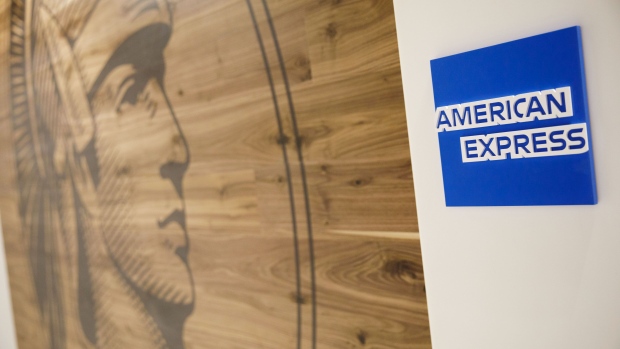May 14, 2020
Carlyle Says Covid Pandemic Warrants Killing AmEx Stock Deal
, Bloomberg News

(Bloomberg) -- The Covid-19 pandemic has decimated the world’s travel industry and fatally crippled a deal calling for the Carlyle Group Inc. and Singapore sovereign-wealth fund GIC Pte. to buy 20% of American Express Global Business Travel, according to unsealed lawsuits.
Carlyle and GIC asked a judge in separate lawsuits to let them scrap the deal. In the lawsuits, the funds disputed claims by an investment group led by Certares Management LLC -- slated to sell the shares in the deal -- that the pandemic doesn’t provide legitimate legal grounds for pulling the plug. The $1.5 billion stock-purchase valued the travel entity’s total worth at $5 billion.
Certares, respresenting other investors in the deal, sued earlier seeking an order from a judge to force Carlyle and GIC to finalize the deal. On Thursday, it failed to persuade Delaware Chancery Court Judge Joseph Slights III to schedule a quick trial on its lawsuit. Slights said it would be “impractical and imprudent” to try to protect the deal’s June 30 financing deadline with a speedy hearing.
“It’s not feasible in times we are in now, where most of the country is locked down because of a pandemic, international travel discouraged and health of population still at risk,” the judge said. Certares’ lawyer Tibor Nagy argued that without a trial by the end of June, financing for the deal would collapse.
“If this deal doesn’t close by June 30, it will never close,” Nagy told the judge on a conference call. Jonathan Polkes, one of Carlyle’s lawyers, reminded the judge a decision on whether Covid-19 provides proper legal grounds to renege on deals will be groundbreaking. “This is going to be a very closely watched, bellwether case,” he said.
‘Confident’
“We respect the judge’s decision today that the unique circumstances of the pandemic will not permit for an expedited trial, but we are confident in our case and will continue to pursue it vigorously,” Charles Zehren, a Certares spokesman, said in an emailed statement.
The sale’s specific terms don’t bar canceling it if the world is rocked by a worldwide health crisis -- like a pandemic -- that paralyzes the airline, hotel and rental-car industries, Carlyle’s and GIC’s lawyers said in the lawsuits.While the sale agreement allocates “certain risks to the purchasers, glaringly absent is a carve-out for pandemics,” Carlyle’s lawyers said.
Busted Deals
The dispute is among more than a half-dozen busted-deal cases tied to Covid-19 that landed in Delaware’s business court. The state is the corporate home to more than half of U.S. public companies and more than 60% of Fortune 500 firms. Chancery judges hear cases without juries and can’t award punitive damages.“Their claims are entirely pretextual,” Zehren said Wednesday of Carlyle’s and GIC’s arguments. “The global pandemic was already well underway when Carlyle and GIC moved to back out of their legal obligations just prior to closing.”
The pandemic has buffeted the travel industry, as companies are suffering severe revenue drops. AmEx GBT offers travel services primarily to businesses that book airfare and hotel rooms.
Material Adverse Effect
Carlyle and GIC say the economic blows the U.S. economy suffered from the virus amount to a “material adverse effect” under the stock-purchase agreement that allows them to scuttle the deal. Such clauses are common in M&A deals.
“The Covid-19 pandemic has caused an unprecedented contraction in the travel industry far more severe than that resulting from any prior natural disaster, terrorist attack, or other disruption,” Carlyle’s lawyers said.Two years ago, a Delaware judge invoked a material adverse effect clause to allow German drugmaker Fresenius SE to cancel a $4.3 billion buyout of U.S. rival Akorn Inc., which tried to cover up serious quality-control problems.
Moves by AmEx GBT -- run by Greg O’Hara, founder and head of New York-based Certares -- responding to the virus also violated the terms of the stock deal, according to Carlyle’s and GIC’s court filings.The joint venture’s cost-cutting measures, including cutting employees’ salaries, imposing a hiring freeze and cracking down on operating expenses means executives haven’t been operating the travel firm “in the ordinary course” of business as required by deal’s terms, GIC said.
It’s “fundamentally unfair to purchasers, who are being asked to pay far more for a company that is a mere shell of what it once was,” GIC said.The Delaware cases are Juweel Investors Limited v. Carlyle Roundtrip, LP, No. 2020-0338, Delaware Chancery Court, Carlyle Roundtrip, LP v. Juweel Investors, No. 2020-0351, Delaware Chancery Court, Pure Magenta Investment Pte. Ltd. V. Juweel Investors Limited, No. 2020-0354 (Dover).
(Updates with company comment in sixth paragraph)
©2020 Bloomberg L.P.